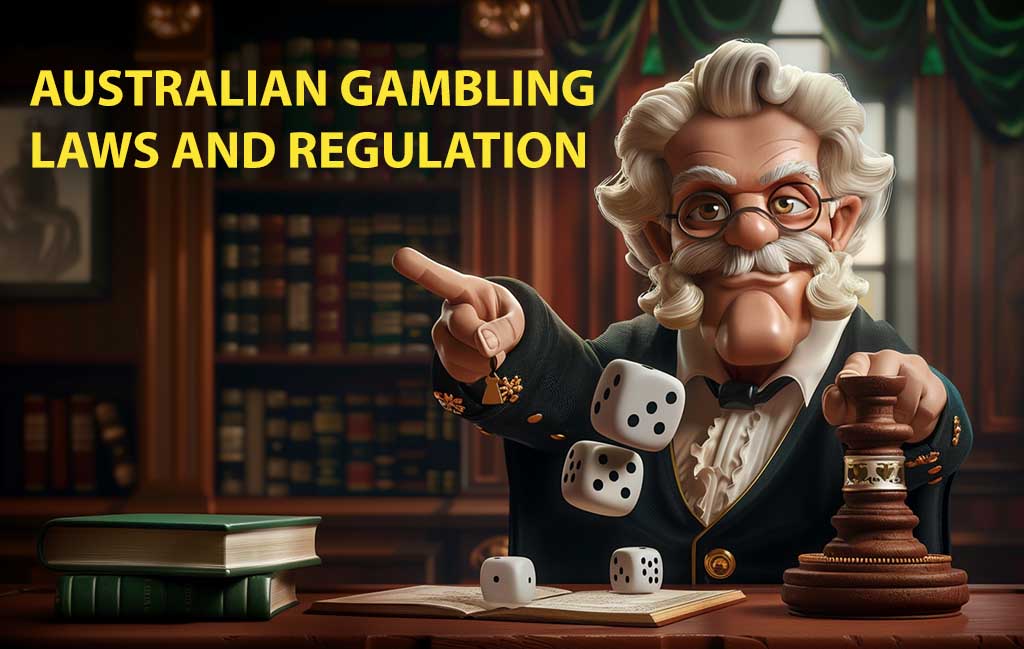Gambling is one of the most popular forms of entertainment in Australia. It is part of their culture. However, its legality is governed by a web of interwoven laws and regulations that vary across the country’s jurisdictions. This multi-layered approach ensures consumer protection, responsible gambling practices, and the integrity of gaming activities. In addition, online gambling is becoming a norm, but where does it fit into the current regulatory environment? This article will help you understand more about the gambling regulation in Australia, such as the relevant laws and regulatory bodies, and the implications for you as a consumer or operator.

Legality of Gambling in Australia
Legal forms of gambling must comply with state and territorial laws or will not be permitted in specific states. They include:
- Pre-sports/race betting in person or online via licensed bookmakers and websites.
- Horse, greyhound, and harness racing.
- National or state/territory licensed lotteries.
- Scratch-off tickets (scratchies).
- Casinos that offer slot machines (pokies) and table games in specific states and territories.
- Poker machines that are placed in licensed venues such as hotels, clubs, and pubs (regulations depend on maximum bet limits, number of machines & operating hours). Some venues can provide poker without being regulated in the strict manner casinos face so long as no third party receives any part of the gambling money.
- Keno, which is hosted within licensed venues.
- Traditional & electronic bingo.
- Fantasy sports betting is legalized by the various interpretations of states and territories and usually occurs through licensed Corporate Bookmakers.
FYI: HARNESS RACING IS WHEN A SPECIFIC BREED OF HORSE (STANDARDBREDS) PULLS A TWO-WHEELED CART OR RACE-BIKE WITH A RIDER STEERING THE HORSE. DURING THE RACE, THESE HORSES ONLY TROT OR PACE.
Illegal forms of gambling which are monitored by the Australian Communications and Media Authority (ACMA) include:
- In-play sports betting.
- Online casino games, slot machines, and poker.
- Online lotteries or betting on the outcome of a lottery.
- Online betting from unlicensed providers.
- Providing or helping to provide credit for gambling by certain operators.
IN-PLAY BETTING REFERS TO PLACING A WAGER DURING A GAME OR RACE
Is Gambling Legal in Australia?
Yes, gambling is legal in Australia, but it is regulated extensively to ensure fairness and protect individuals and communities from potential harm. The legality and regulation of gambling activities are overseen by federal and state/territory governments, each with its own laws and regulatory bodies.
Here’s an overview of the legal framework for gambling regulation in Australia:
Interactive Gambling Act 2001 (IGA)
The Interactive Gambling Act 2001 (IGA) is a key legislation in Australia regulating online gambling services.
- The IGA primarily restricts online gambling operators, making it illegal for them to offer certain services to people in Australia, such as online casinos and in-play sports betting poker rooms, and unlicensed gambling services (without an Australian license).
- It’s illegal to advertise these services through any media, including online platforms, broadcast, print, billboards, etc.
- However, some exemptions exist, such as betting on sporting events (horse racing and sports betting) with a licensed operator or certain lottery services.
- The gambling regulation in Australia also focuses on consumer protection and aims to protect Australian consumers from the potential harms of online gambling.
The Australian Communications and Media Authority (ACMA) enforces gambling regulations in Australia. It has the authority to investigate and take action against operators offering prohibited services or violating advertising restrictions.
Despite its aims, the IGA faces challenges in enforcement, particularly regarding the regulation of offshore gambling operators. Critics argue that more needs to be done to address these challenges and protect Australian consumers.
 State and Territory Regulations
State and Territory Regulations
Australia has six states and two territories. Each state has its own regulatory body and legislation governing various forms of gambling. These include;
- New South Wales (NSW). The state’s Liquor and Gaming New South Wales (L&GNSW) is under the direction of the Hospitality and Racing Group as part of the NSW Department of Enterprise, Investment and Trade. Their key responsibilities include developing policies, issuing licenses, and ensuring compliance. Additionally, the Independent Liquor and Gaming Authority (ILGA) makes autonomous decisions regarding gaming machine requirements, liquor distribution, and registered club activities. The NSW Independent Casino Commission (NICC) regulates casinos in the state.
- Victoria (VIC). Victoria has a substantial gambling market, with several casinos and a variety of legal gambling options. The Victorian Commission for Gambling and Liquor Regulation (VCGLR)governs licensing and safety measures.
- Queensland (QLD). The Queensland Office of Liquor and Gaming Regulation (QOLGR) is in charge of licensing and compliance and developing programs to minimize the potentially negative effects of the gambling and liquor industries. The Queensland Department of Justice and Attorney-General instruct both these offices.
- Western Australia (WA). It has a moderately restrictive approach to gambling compared to states like NSW and VIC. There is only one operational casino in Perth. Pokies are restricted to casinos, not available in pubs or clubs. Sports betting is legal and regulated. The Western Australian Department of Racing, Gaming, and Liquor (DRGL) oversees gambling here.
- South Australia (SA). The Attorney-General’s Department has given the Consumer and Business Services (CBS) authority to issue licenses, formulate or amend policies, and confirm compliance by casinos, electronic gaming machines, lotteries, and wagering activities. Simultaneously, the Lotteries Commission of South Australia sits within the Auditor General’s Department and works to promote and conduct lotteries in South Australia. To complete its duties, the Commission has appointed a master agent to control the distribution of lottery-related products and brands.
- Tasmania (TAS). The Tasmanian Liquor and Gaming Commission (TLGC) is the sole authority responsible for licensing and compliance. It sits within the Department of Treasury and Finance and implements the Gaming Control Act 1993. This gambling law in Australia provides the legislative framework regulating gambling in Tasmania. The activities regulated by the Act include gaming machines, keno, casino gaming, sports betting, and totalizator/pari-mutuel wagering. It also outlines the requirements for issuing foreign gaming permits.
- Australian Capital Territory (ACT). Within the portfolio of the Minister for Racing and Gaming is the Gambling and Racing Commission – an autonomous gambling authority that grants gambling licenses, monitors compliance by establishments, and also provides education to the public to promote responsible gambling.
- Northern Territory (NT). The NTRC, or Northern Territory Racing Commission, has enacted laws regulating betting or gambling in the NT. These include the issuance of a single totalisator license for all on-premises or on-course betting. Gambling is governed by the Gambling Machine Act and the Gambling Control Act.
Q: What is totalisator betting?
A: This is a betting system where the sportsbook pools all the bettors’ money into one large pool. Any winnings are distributed proportionally depending on the amount of money you have placed in the pool and the total amount of money in the pool.
According to the Australian Constitution, the federal government is obligated to monitor and regulate activities such as telecommunications, trade, and the movement of money among states and territories.
These powers have resulted in the federal government passing legislation that controls areas such as implementing anti-money laundering and counter-terrorism financing (AML/CTF), providing interactive gambling, protecting consumers, and regulating competition in the country.
- AML/CTF legislation: The Australian Transaction Reports and Analysis Centre (AUSTRAC) is responsible for implementing the Anti-Money Laundering and Counter-Terrorism Financing Act 2006 (AML/CTF Act) which categorizes certain gambling activities as ‘designated services’. These entities are obligated to:
- Register with AUSTRAC.
- Establish and maintain an AML/CTF Program that meets compliance requirements.
- Report certain transactions to AUSTRAC, such as suspicious matter reports (SMRs) and threshold transaction reports (TTRs). If you are a provider of gambling activities in Australia, you are likely to face civil penalties and possible criminal action if you fail to implement and maintain a comprehensive AML/CTF program, do not file required reports on time, or do not file them at all. The authorities take lack of compliance as a serious offense, as demonstrated by the $300.3 million penalty handed to Crown Resorts, the country’s largest gambling and entertainment group. This was after AUSTRAC discovered that the company was working outside of the AML/CTF Act. Also, being one of the highest penalties a casino has been ordered to pay internationally, the then-acting CEO of AUSTRAC commented that the move “serves as a clear warning” to owners of gambling licenses to take the necessary steps to minimize the risk of committing financial crimes.
- Interactive Gambling: The Australian Communications and Media Authority (ACMA) regulates Australia’s media and communication services, including the internet, phones, TV, and radio. Consequently, they monitor any gambling conducted online or over the phone, which is known as interactive gambling. The Interactive Gambling Act (IGA) prohibits certain activities as mentioned above and guides the operation of gambling services, including online gambling, with the purview of protecting consumers.
- Consumer Protection and Communication: Gamers are protected under the Competition and Consumer Act 2010 (CCA), which was enacted by The Australian Competition and Consumer Commission (ACCC). The law monitors gambling advertising and can take legal action if the ACCC finds that gambling service providers are treating consumers unfairly, exploiting them, or taking advantage of them
Gambling Regulation in Australia: Online Gambling in Australia
 The legality of online gambling in the country has been the subject of intense scrutiny, with authorities trying to find a balance between reaping the huge economic benefits and protecting consumers from unscrupulous operators.
The legality of online gambling in the country has been the subject of intense scrutiny, with authorities trying to find a balance between reaping the huge economic benefits and protecting consumers from unscrupulous operators.
Some forms of online gambling, such as pari-mutuel wagering and sports betting, are permitted, but online casino games are not allowed. The exception to the rule is The Northern Territory. If you are a resident of the territory and want to offer your gaming products outside of Australia, you could be granted an internet gaming license. On a federal level, as mentioned above, the IGA defines various forms of online gambling that are not permitted.
Therefore, is online casino legal in Australia? No, online casinos are not legal in Australia. The IGA prohibits the provision of interactive gambling services to Australian residents, including online casino games such as Slots (pokies), roulette, blackjack, and poker.
Despite this gambling regulation in Australia, many citizens can access online casino games through offshore operators, which are not subject to Australian law. These offshore platforms offer a wide range of games, leveraging Bitcoin and other cryptos that align with the Cryptocurrency regulation in Australia. Decentralized crypto assets like Bitcoin provide users with enhanced privacy and anonymity that allows locals to use them for online gambling.
Note that using offshore online casinos poses significant risks for Australian consumers, including a lack of regulatory oversight, potential for unfair practices, and difficulty in resolving disputes. However, our recommended list of Bitcoin Casino Australia will give you a safe and enjoyable gambling experience.
Online Gambling Regulation in Australia
It’s important to note that, the National Consumer Protection Framework for Online Wagering (NCPF) was implemented in all 10 Australian jurisdictions after undergoing various changes and improvements since its proposal in 2018. Some of the measures to protect consumers from harm include prohibiting the provision of lines of credit, offering staff training, and giving access to the National Self-Exclusion Register, among others. You can find all the measures here.
Another key player in monitoring and regulating online gambling is the Australian Communications and Media Authority (ACMA). It has the power to investigate complaints about online gambling platforms, issue warnings, and penalize providers found to be in breach of the IGA.
The ACMA also works with industry stakeholders, including internet service providers (ISPs) and gambling service providers, to educate them about the IGA and encourage compliance. For example, it blocks access to illegal offshore gambling websites. Overall, it plays a crucial role in maintaining a safe and controlled online gambling environment for Australians.
State and territory authorities have the right to implement specific licensing requirements that must adhere to federal laws. Some states are content with the directives in the IGA and cooperate with the federal government to enforce them and reach their shared goal of minimizing risks associated with online gambling and promoting responsible gambling.
NOTE: Businesses that manufacture, supply, or service gambling equipment (including gaming machines, betting terminals, and software) must comply with regulations governing their industry at the state and territory levels.
Gamblers should beware of unscrupulous offshore online gambling operators. They often target Australians due to the high numbers of people who gamble, but the ACMA has increased efforts to curb illegal operators by issuing financial penalties and blocking certain websites to limit access to prohibited online gambling services.
While offering online gambling services to Australians is illegal, technically, users can access offshore websites.
Gambling Laws in Australia
Now that we have covered the gambling landscape and regulation in Australia, here is a highlight of the gambling laws in Australia;
- Online casino games (pokies, blackjack, roulette, etc.) are illegal. Advertising for these services is banned across all media.
- Licensed online wagering for specific events like horse racing and some sports betting with licensed operators is legal.
- The IGA aims to protect Australians from the harmful effects of online gambling by regulating the provision and advertising of interactive gambling services.
- The gambling age in Australia is set at 18 years old across all forms of gambling.
- The Australian Communications and Media Authority (ACMA) is responsible for enforcing the IGA and has the power to investigate and take action against illegal operators.
- Each Australian state and territory has its own set of laws and regulatory bodies governing gambling activities within their jurisdictions.
Gambling Age in Australia
The legal gambling age in Australia is 18 in all states and territories. This age limit applies to various forms of gambling, including casino games, sports betting, lotteries, and gaming machines (pokies).
Gambling venues and online operators are required to check individuals’ identification to ensure they are of legal age. This includes requesting photo ID for entry into casinos, purchasing lottery tickets, or placing bets. Significant penalties are imposed on both operators and individuals if they are found to be facilitating or participating in gambling activities under the legal gambling age in Australia.
To Sum It Up
The gambling regulation in Australia are meant to protect Aussies from the potential harms of gambling, including addiction, financial problems, and mental health issues. This is achieved through restrictions on online gambling activities, responsible gambling measures like self-exclusion programs in casinos, and limitations on advertising. Regulatory bodies such as the Australian Communications and Media Authority (ACMA) play a key role in enforcing the Interactive Gambling Act (IGA) and protecting consumers from illegal online gambling services. In addition, each of the eight mainland states and territories independently regulates gambling activities within their jurisdictions. Despite the complexities and challenges, particularly with the enforcement of offshore online gambling, Australia’s regulatory framework continues to evolve to address emerging trends and technologies. Lastly, we advise you to consult with a legal professional if in doubt about the legality of your gambling operations.
FAQs
